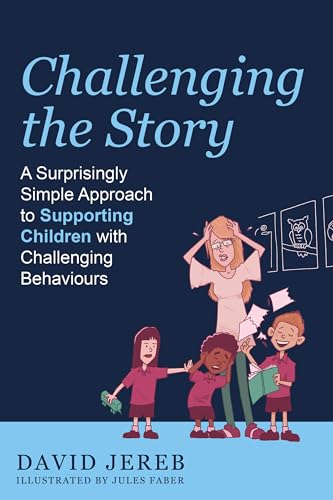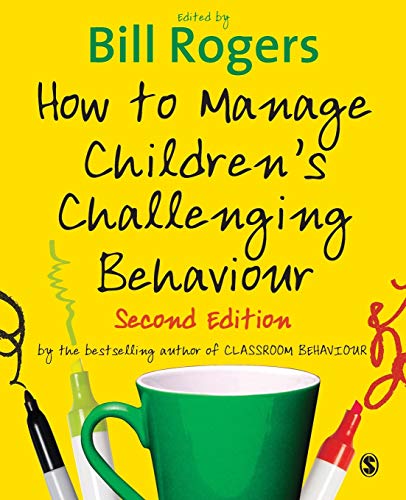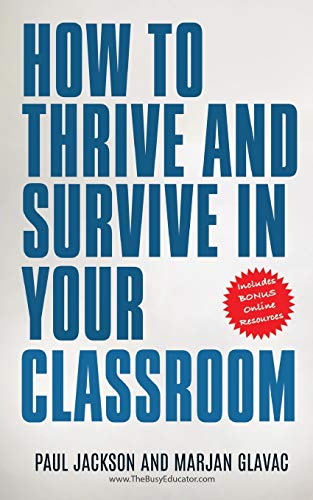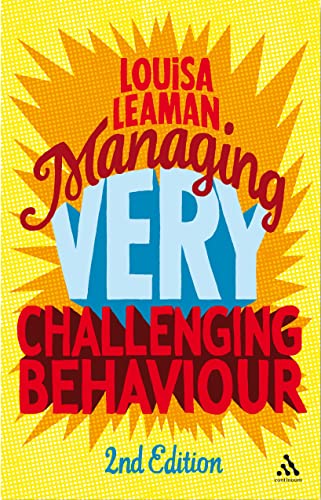
1

2

3

4

5
Educating children is a challenging and important role. As a teacher, you have the opportunity to change the trajectory of their lives. With an increasing trend of challenging behaviour in children, teachers and other key people in a child’s life are under pressure to understand socio-emotional developments and triggers. In classrooms, challenging behaviours can cause chaos and disruption, which is why it is essential to be able to manage such behaviours effectively, preventing future incidents. This collection of books will help you to understand what children are communicating through their behaviour, whilst providing guidance on how to establish appropriate behaviour guidelines and strategies for the most challenging behaviours.
1
Many adults, eager to help children with challenging behaviours, often find themselves trapped in the cycle of addressing the 'what' without truly understanding the 'why'. 'Challenging the Story' by Dave Jereb takes readers on a transformative journey to uncover the root causes behind such behaviours. It explores an empathetic approach to working with children that transcends mere reactions and paves the way for lasting positive change. 'Challenging the Story' aims to change mainstream attitudes towards difficult behaviours which are often misconstrued as ‘acting out’ or aggression. It is a practical guide for parents, educators, health professionals, and any other key person who plays a role in looking after a child. Throughout, Dave helps readers better recognise the context of children’s behaviours, empathise, change their own assumptions and constructively respond to situations in ways that can transform a child’s behaviour and their entire life trajectory. An educational allegory that blends real-world experiences with strategies that have transformed the lives of many children and their families, 'Challenging The Story' is a thoughtfully-crafted introduction to understanding neurodivergent children. It combines heart-filled examples with practical wisdom and realistic advice. 'Challenging The Story' emphasises the importance of viewing children’s actions not simply as behaviours, but as a language - a manifestation of their underlying capacities, experiences and environment. By challenging their own initial interpretations of children’s behaviours, readers have the power to successfully guide children towards a new and empowering narrative.
2
In 'How to Manage Children's Challenging Behaviour', Bill Rogers brings together contributions from practising teachers that suggest ways to tackle very challenging behaviour in schools such as bullying, violence and behaviour disorders. All teachers face similar disruptions in the classroom, such as calling out and interrupting, but this book addresses the more serious issues. Bill introduces and comments on each chapter, setting out his key principles for behaviour leadership in the style that makes him such a popular author. There are numerous case studies drawn from practice, in each case showing how the teacher managed the situation and what the outcome was, and these examples from practice highlight the difference teachers can make to their students' behaviour, attitude, self-esteem and peer acceptance. Chapters look at: finding a way back from inappropriate behaviour; dealing with challenging behaviour day after day; creating a peaceful school; focusing on the positives; the importance of the teacher-pupil relationship; taking an holistic view of the child, and how this helps reduce disruptive behaviour. The direct, practical and inspirational nature of these accounts will resonate with all teachers and school support staff working with any age group. Based on the everyday experiences of the teachers who have written them, these are teachers' voices offering sound advice and guidance to fellow teaching professionals.
3
In 'How to Thrive and Survive in Your Classroom', authors Marjan Glavac & Paul Jackson reveal strategies on how to create your ideal classroom, motivate your students, maintain their attention and keep them on task without screaming, pleading, or burning yourself out. Now, more than ever, keeping and holding the attention of students is a challenge. Lots of people give up and leave the teaching profession. The daily struggles can ruin the joy of teaching. And there isn’t enough time in the day to cover everything. With this book you will learn how to motivate students, eliminate misbehaviours, learn the secrets to individualised instructions, and setting and achieving goals. You’ll love this book because of the depth of brilliant ideas to change your classroom.
4
Is there a knot in your stomach before you step into class? Are disruptive, defiant children part of your nightmares? Is the lack of control of your classroom affecting your lesson plans, your self-confidence, and ultimately your life? Marjan Glavac shares his 29 years of teaching experience in troubled schools for empowerment of elementary teachers inside the classroom. 'How To Succeed As An Elementary Teacher' contains a bonus online workbook containing blackline masters, additional resources and websites. You will learn; effective and easy techniques to remain calm, stay in control, and teach stress free… even when students are pressing your buttons! You will also learn a teaching strategy that will win back your disruptive students. What's more, you will be able to anticipate and prevent inappropriate behaviours. This book guides you through tested techniques designed to build rapport with disruptive students, inspire unmotivated kids, overcome the challenges of teaching, together with effective tools and strategies to regain classroom control in the toughest teaching environments from the first to the last day of school.
5
'Managing Very Challenging Behaviour' provides a structured approach to tackling behaviour, from low-level problems, right through to coping with extreme behaviour. In this authoritative guide, author Louisa Leaman provides practical, tried-and-tested advice on how to deal with the full spectrum of poor behaviour. She lays out a comprehensive framework, with strategies for managing low and medium level disruption, as well as how to combat higher-level aggression. This book provides invaluable support for all teachers tackling extreme behaviour in primary and secondary sectors, whether they are established teachers, SENCOs or NQTs. 'Managing Very Challenging Behaviour' includes guidance on key behavioural issues, including: staying positive when things get tough; challenging gang culture and weapons in school; managing students' attitude; considering why pupils misbehave; reflecting on your own practice; thinking about inclusion and behaviour; engaging parents/guardians; dealing with group dynamics; tackling verbal abuse; and, coping with the stress caused by disruptive pupils. This book is a must for all teachers who meet with challenging behaviour in their classrooms.

1
Many adults, eager to help children with challenging behaviours, often find themselves trapped in the cycle of addressing the 'what' without truly understanding the 'why'. 'Challenging the Story' by Dave Jereb takes readers on a transformative journey to uncover the root causes behind such behaviours. It explores an empathetic approach to working with children that transcends mere reactions and paves the way for lasting positive change. 'Challenging the Story' aims to change mainstream attitudes towards difficult behaviours which are often misconstrued as ‘acting out’ or aggression. It is a practical guide for parents, educators, health professionals, and any other key person who plays a role in looking after a child. Throughout, Dave helps readers better recognise the context of children’s behaviours, empathise, change their own assumptions and constructively respond to situations in ways that can transform a child’s behaviour and their entire life trajectory. An educational allegory that blends real-world experiences with strategies that have transformed the lives of many children and their families, 'Challenging The Story' is a thoughtfully-crafted introduction to understanding neurodivergent children. It combines heart-filled examples with practical wisdom and realistic advice. 'Challenging The Story' emphasises the importance of viewing children’s actions not simply as behaviours, but as a language - a manifestation of their underlying capacities, experiences and environment. By challenging their own initial interpretations of children’s behaviours, readers have the power to successfully guide children towards a new and empowering narrative.

2
In 'How to Manage Children's Challenging Behaviour', Bill Rogers brings together contributions from practising teachers that suggest ways to tackle very challenging behaviour in schools such as bullying, violence and behaviour disorders. All teachers face similar disruptions in the classroom, such as calling out and interrupting, but this book addresses the more serious issues. Bill introduces and comments on each chapter, setting out his key principles for behaviour leadership in the style that makes him such a popular author. There are numerous case studies drawn from practice, in each case showing how the teacher managed the situation and what the outcome was, and these examples from practice highlight the difference teachers can make to their students' behaviour, attitude, self-esteem and peer acceptance. Chapters look at: finding a way back from inappropriate behaviour; dealing with challenging behaviour day after day; creating a peaceful school; focusing on the positives; the importance of the teacher-pupil relationship; taking an holistic view of the child, and how this helps reduce disruptive behaviour. The direct, practical and inspirational nature of these accounts will resonate with all teachers and school support staff working with any age group. Based on the everyday experiences of the teachers who have written them, these are teachers' voices offering sound advice and guidance to fellow teaching professionals.

3
In 'How to Thrive and Survive in Your Classroom', authors Marjan Glavac & Paul Jackson reveal strategies on how to create your ideal classroom, motivate your students, maintain their attention and keep them on task without screaming, pleading, or burning yourself out. Now, more than ever, keeping and holding the attention of students is a challenge. Lots of people give up and leave the teaching profession. The daily struggles can ruin the joy of teaching. And there isn’t enough time in the day to cover everything. With this book you will learn how to motivate students, eliminate misbehaviours, learn the secrets to individualised instructions, and setting and achieving goals. You’ll love this book because of the depth of brilliant ideas to change your classroom.

4
Is there a knot in your stomach before you step into class? Are disruptive, defiant children part of your nightmares? Is the lack of control of your classroom affecting your lesson plans, your self-confidence, and ultimately your life? Marjan Glavac shares his 29 years of teaching experience in troubled schools for empowerment of elementary teachers inside the classroom. 'How To Succeed As An Elementary Teacher' contains a bonus online workbook containing blackline masters, additional resources and websites. You will learn; effective and easy techniques to remain calm, stay in control, and teach stress free… even when students are pressing your buttons! You will also learn a teaching strategy that will win back your disruptive students. What's more, you will be able to anticipate and prevent inappropriate behaviours. This book guides you through tested techniques designed to build rapport with disruptive students, inspire unmotivated kids, overcome the challenges of teaching, together with effective tools and strategies to regain classroom control in the toughest teaching environments from the first to the last day of school.

5
'Managing Very Challenging Behaviour' provides a structured approach to tackling behaviour, from low-level problems, right through to coping with extreme behaviour. In this authoritative guide, author Louisa Leaman provides practical, tried-and-tested advice on how to deal with the full spectrum of poor behaviour. She lays out a comprehensive framework, with strategies for managing low and medium level disruption, as well as how to combat higher-level aggression. This book provides invaluable support for all teachers tackling extreme behaviour in primary and secondary sectors, whether they are established teachers, SENCOs or NQTs. 'Managing Very Challenging Behaviour' includes guidance on key behavioural issues, including: staying positive when things get tough; challenging gang culture and weapons in school; managing students' attitude; considering why pupils misbehave; reflecting on your own practice; thinking about inclusion and behaviour; engaging parents/guardians; dealing with group dynamics; tackling verbal abuse; and, coping with the stress caused by disruptive pupils. This book is a must for all teachers who meet with challenging behaviour in their classrooms.
© Five Books 2026